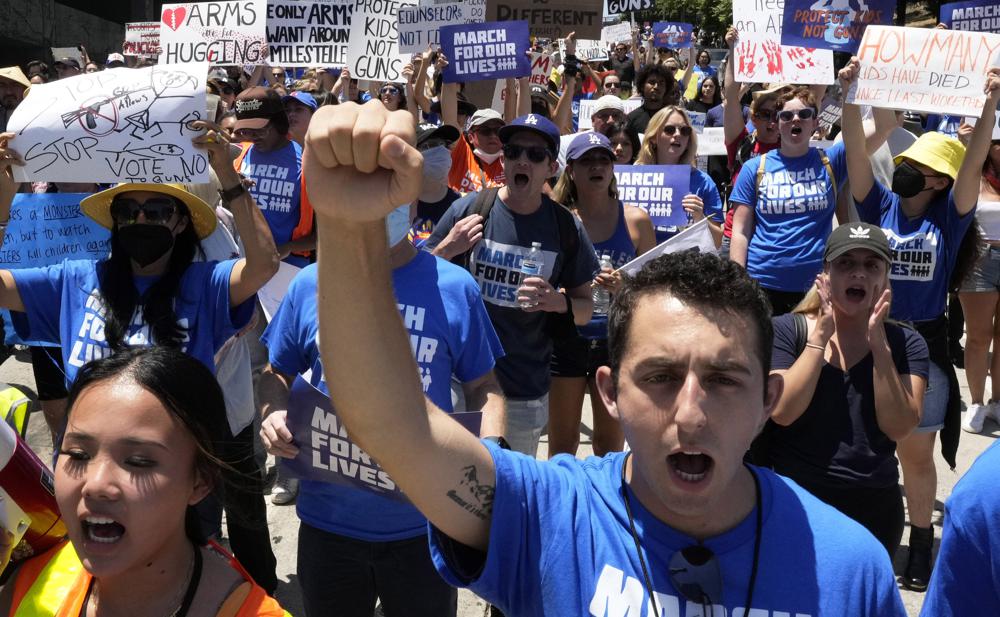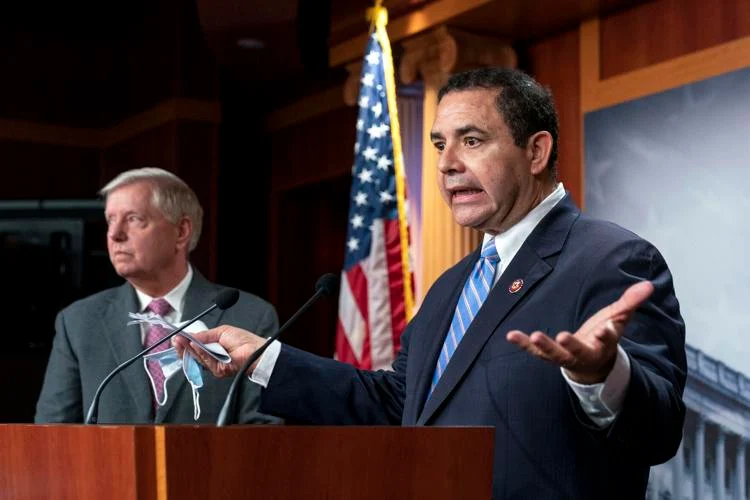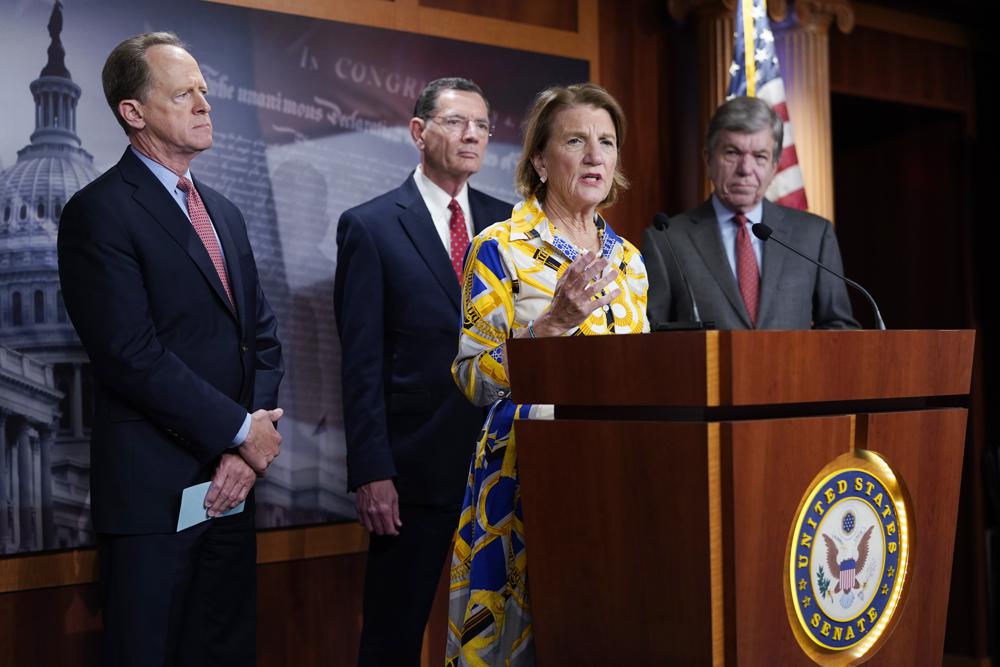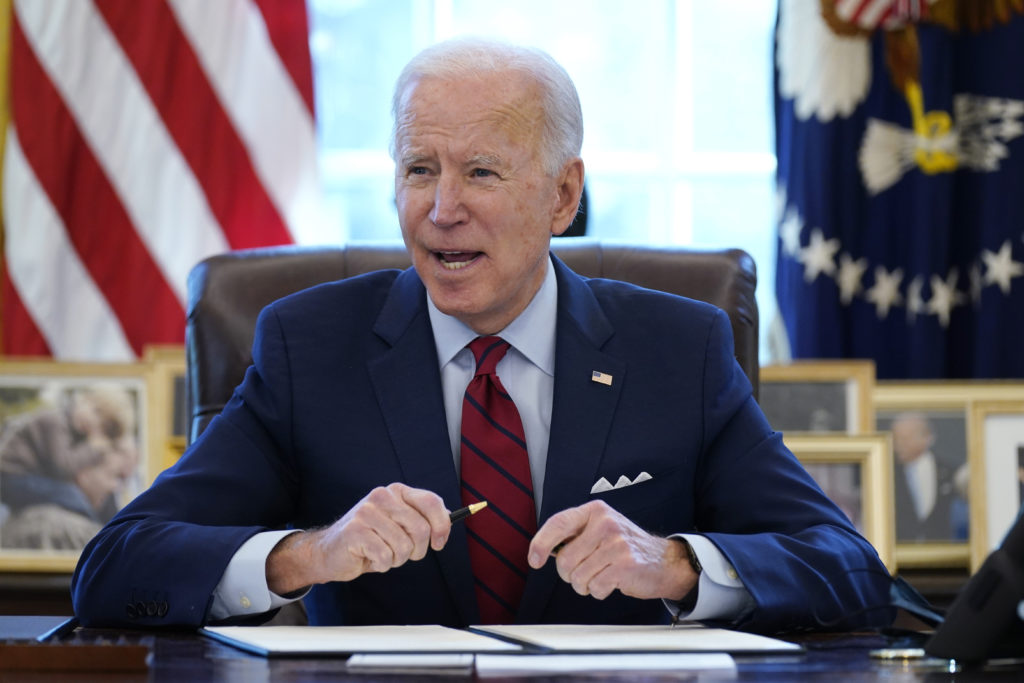Senate negotiators announce a deal on guns, breaking logjam

Senate bargainers on Sunday announced the framework of a bipartisan response to last month’s mass shootings, a noteworthy but limited breakthrough offering modest gun curbs and stepped-up efforts to improve school safety and mental health programs. The proposal falls far short of tougher steps long sought by President Joe Biden and many Democrats. Even so, the accord was embraced by Biden, and enactment would signal a significant turnabout after years of gun massacres that have yielded little but stalemate in Congress. Biden said in a statement that the framework “does not do everything that I think is needed, but it reflects important steps in the right direction and would be the most significant gun safety legislation to pass Congress in decades.” Given the bipartisan support, “there are no excuses for delay, and no reason why it should not quickly move through the Senate and the House,” he said. Leaders hope to push any agreement into law rapidly — they hope this month — before the political momentum fades that has been stirred by the recent mass shootings in Buffalo, New York, and Uvalde, Texas. Participants cautioned that final details and legislative language remain to be completed, meaning fresh disputes and delays might emerge. In a consequential development, 20 senators, including 10 Republicans, released a statement calling for passage. That is potentially crucial because the biggest obstacle to enacting the measure is probably in the 50-50 Senate, where at least 10 GOP votes will be needed to attain the usual 60-vote threshold for approval. “Families are scared, and it is our duty to come together and get something done that will help restore their sense of safety and security in their communities,” the lawmakers said. The group, led by Sens. Chris Murphy, D-Conn., John Cornyn, R-Texas, Thom Tillis, R-N.C., and Krysten Sinema, D-Ariz., produced the agreement after two weeks of closed-door talks. The compromise would make the juvenile records of gun buyers under age 21 available when they undergo background checks. The suspects who killed 10 Black people at a grocery store in Buffalo and 19 students and two teachers at an elementary school in Uvalde were both 18, and many perpetrators of recent years’ mass shootings have been young. The agreement would offer money to states to enact and put in place “red flag” laws that make it easier to temporarily take guns from people considered potentially violent, plus funds to bolster school safety and mental health programs. Some people who informally sell guns for profit would be required to obtain federal dealers’ licenses, which means they would have to conduct background checks of buyers. Convicted domestic abusers who do not live with a former partner, such as estranged ex-boyfriends, would be barred from buying firearms, and it would be a crime for a person to legally purchase a weapon for someone who would not qualify for ownership. Congressional aides said billions of dollars would be spent expanding the number of community mental health centers and suicide prevention programs. But they said some spending decisions are unresolved, as are final wording on juvenile records and other gun provisions that might prove contentious. Yet underscoring election-year pressures from Buffalo and Uvalde, the parties’ shared desire to demonstrate a response to those shootings suggested momentum toward enactment was strong. Senate Majority Leader Chuck Schumer, D-N.Y., called the accord “a good first step to ending the persistent inaction to the gun violence epidemic” and said he would bring the completed measure to a vote as soon as possible. Senate Minority Leader Mitch McConnell, R-Ky., who has supported the talks, was more restrained. He praised the bargainers’ work and said he is hoping for a deal that makes “significant headway on key issues like mental health and school safety, respects the Second Amendment, earns broad support in the Senate, and makes a difference for our country.” The agreement was quickly endorsed by groups that support gun restrictions, including Brady, Everytown for Gun Safety, and March for Our Lives, which organized rallies held around the country on Saturday. The National Rifle Association said in a statement that it opposes gun control and infringing on people’s “fundamental right to protect themselves and their loved ones,” but supports strengthening school security, mental health, and law enforcement. The group has long exerted its sway with millions of firearms-owning voters to derail gun control drives in Congress. The agreement represents a lowest common denominator compromise on gun violence, not a complete sea change in Congress. Lawmakers have demonstrated a newfound desire to move ahead after saying their constituents have shown a heightened desire for congressional action since Buffalo and Uvalde, but Republicans still oppose more sweeping steps that Democrats want and Sunday’s agreement omits. These include banning assault-style firearms such as the AR-15 style rifles used in Buffalo and Uvalde or raising the legal age for buying them. AR-15s are popular and powerful semiautomatic weapons that can fire high-capacity magazines and have been used in many of the nation’s highest-profile slaughters in recent years. One of them, the killing of 49 people at the Pulse nightclub in Orlando, Florida, occurred six years ago Sunday. Democrats have also wanted to ban high-capacity magazines and to expand required background checks to far more gun purchases. None of those proposals has a chance in Congress. Highlighting that, the Democratic-controlled House approved sweeping bills this past week barring sales of semiautomatic weapons to people under age 21 and large-capacity magazines and giving federal courts the power to rule when local authorities want to remove guns from people considered dangerous. Currently, only 19 states and the District of Columbia have red-flag laws. Those measures will go nowhere in the Senate, where Republicans can block them. The last major firearms restrictions enacted by lawmakers was the 1994 assault weapons ban, which Congress let expire ten years later. For years, congressional Republicans representing rural, pro-gun voters have blocked robust restrictions on firearms purchases, citing the Constitution’s Second Amendment. Democrats, whose voters overwhelmingly favor gun restrictions, have been reluctant to approve incremental steps that
Growing number of Democrats call on Joe Biden to reverse plan to end Title 42

A Democratic governor and several Democrats in Congress are calling on President Joe Biden to reverse the U.S. Centers for Disease Control and Prevention’s decision to end Title 42. Title 42, a public health authority that enables federal agents to quickly expel illegal immigrants during a public health emergency, has been in effect since March 2020. On April 1, the CDC announced it was terminating it on May 23. U.S. Rep. Henry Cuellar, a Democrat from the border town of Laredo, Texas, told Fox News Sunday that Biden was listening to immigration activists, not border communities or their representatives such as himself. “But my question is, who’s listening to the men and women in green and in blue?” he asked, referring to Customs and Border Protection and Border Patrol agents. “And more importantly, who’s listening to the border communities, the sheriffs, the landowners, the rest of the people that live on the border?” he asked. Cuellar is facing a tough runoff election May 24 and, if he wins, a tough general election in November. “How can we have the federal public emergency extended to July 15 and say there’s a pandemic going on in the United States, but at the border, everything’s fine, and just let people into the United States,” he said, adding, “Those are mixed messages.” He also addressed the administration’s mixed messages when it comes to mandates. “How can you ask for international travelers to make sure … they’re vaccinated or even show their COVID-19 negative tests if they fly in?” Cueller asked, referring to vaccine mandates imposed on legal travelers when no such requirements exist for those who’ve entered the U.S. illegally and are then released into the U.S. by the Biden administration. Cuellar also posted pictures of existing overcrowded holding facilities at the border with Title 42 in place. “Title 42 is critical to ensuring the health and safety of migrants, law enforcement, and border residents,” he said. Democratic Nevada Gov. Steve Sisolak wrote Biden late last week expressing concerns about Title 42 ending. He asked him “to reconsider any intentions of undoing Title 42 until there is a comprehensive plan for how the United States can avoid the humanitarian crisis this policy change would spark.” The CDC issued a statement on April 1 announcing it was ending Title 42 due to “an increased availability of tools to fight COVID-19 (such as highly effective vaccines and therapeutics)” and said, “suspending the right to introduce migrants into the United States is no longer necessary.” Instead, the Department of Homeland Security was implementing “appropriate COVID-19 mitigation protocols, such as scaling up a program to provide COVID-19 vaccinations to migrants and prepare for resumption of regular migration under Title 8,” the CDC said. But on April 12, Health and Human Services Secretary Xavier Becerra announced he was renewing the national public health emergency order “as a result of the continued consequences of the Coronavirus Disease 2019 (COVID-19) pandemic.” He said the public health emergency “exists and has existed since January 27, 2020, nationwide,” and was renewed by the Trump and Biden administrations eight times. Set to expire April 15, it was renewed effective April 16 for an additional 90 days. Arizona Democratic U.S. Sen. Krysten Sinema argues extending the public health emergency “proves the need to delay lifting Title 42 to protect the health and safety of Arizona communities and migrants.” In a statement, she said she would “keep pushing for transparency and accountability from the administration to help secure the border, keep Arizona communities safe, and ensure migrants are treated fairly and humanely.” Earlier this month, she joined a bipartisan effort to prevent Title 42’s end until after the national public health emergency order ends. Sen. Mark Kelly, D-Ariz., the lead Democratic cosponsor, filed the Public Health and Border Security Act of 2022. Joining him as Democratic cosponsors were Sinema and Sens. Joe Manchin from West Virginia, Jon Tester from Montana, and Maggie Hassan from New Hampshire. U.S. Rep. Jared Goldman, D-Maine, was the lead Democratic cosponsor of the companion bill in the House. Joining him were Democratic cosponsors, Reps. Tom O’Halleran and Greg Stanton of Arizona, Chris Pappas of New Hampshire, Stephanie Murphy of Florida, Abigail Spanberger of Virginia, and Tim Ryan of Ohio. The bill isn’t likely to pass the House even if it were to pass the Senate. So far, 22 states have sued to stop the administration from halting Title 42 in two separate lawsuits. Unless the Biden administration is stopped by the courts, DHS announced last month measures it was putting in place to prepare for up to 18,000 people a day expected to enter U.S. custody once Title 42 is lifted. This estimate is in addition to the roughly 2 million people who were apprehended or encountered by Border Patrol agents in Biden’s first year in office while Title 42 was in place. All encounter numbers exclude “gotaways,” those who evade capture and don’t surrender at ports of entry. Republished with the permission of The Center Square.
Joe Biden, GOP senator talk as time drags on infrastructure deal

For nearly an hour, President Joe Biden and the top Senate Republican negotiating infrastructure met behind closed doors — two seasoned legislators engaged in another round of conversations, but emerging with few outward signs of tangible progress ahead of a deadline next week. The White House billed the private meeting Wednesday as more of a conversation with West Virginia GOP Sen. Shelley Moore Capito rather than a formal negotiation. No new offers were expected to be presented. More than anything, the session in the Oval Office was seen through the political lens of the president and Republicans trying to show the public what Americans say they want — a willingness to work together, even if no deal is within reach. Biden and Capito had a “constructive and frank conversation,” according to a White House official granted anonymity to discuss the private talks. The senator’s office said she is encouraged by the ongoing conversations. The two agreed to reconnect Friday. Still, talks over Biden’s top legislative priority have been moving slowly, a daunting undertaking given the massive infrastructure investment, and time for a deal is running out. The administration has set a June 7 deadline to see clear direction and signs of progress. “The fact that the president is having Sen. Capito here today and has been having ongoing discussions with Republicans in the Senate and that he’s eager to find a path forward on bipartisanship work certainly tells you, I think, what you need to know about what he thinks about working with people even when there’s disagreement,” White House Press Secretary Jen Psaki said ahead of the afternoon session. Privately, the president has sized up the GOP’s latest $928 billion offer as unworkable, in large part because it taps unused COVID-19 funds. Instead, Biden wants to hike the corporate tax rate — a nonstarter for Senate Republicans — to generate revenue for his $1.7 trillion package. The ongoing talks may take on new importance after Democrats suffered a setback Wednesday in their efforts to attempt to pass this and other Biden priorities on party-line votes. The Senate parliamentarian signaled new limits on how many times Democrats can use the budget reconciliation process that allows a 51-vote threshold, rather than the 60 votes typically needed to advance legislation. In a four-page memo, the parliamentarian made it clear Democrats will likely have only more only one more opportunity to use the budget process this year, essentially closing the door on a strategy they were eyeing for multiple votes. Friday’s next round of talks between Biden and the Republican senator would overlap with the release of the May jobs report, as private economists estimate a meaningful increase from the disappointing April figures. May’s jobs figures could provide evidence as to whether Biden’s earlier $1.9 trillion COVID-19 relief package has helped put the country on track to recover the jobs lost to the pandemic. Heading into the meeting, Capito was expected to re-up the GOP’s push to repurpose the coronavirus relief fund to pay for infrastructure investments, said Senate Republican leader Mitch McConnell, who has tasked her to lead the discussions. “That’s the key to getting a bipartisan agreement,” McConnell said at a press conference in Kentucky. He said he particularly wants to halt unemployment assistance that he says is preventing Americans from returning to work. “The coronavirus is behind us. We need to get back to work,” McConnell said. Together, the president and the Republicans both have political incentives to negotiate a bipartisan accord over his sweeping investment package, even if no deal is within sight. For Biden, reaching across the aisle and cutting deals in Congress is central to his brand of politics. Republicans can also score political gains by trying to work with a popular president. Yet an initial Memorial Day deadline came and went without results, and in the latest round of talks, Biden and a core group of GOP senators appear to have pulled farther apart. Democrats, who hold slim majorities in the House and Senate, are watching warily as the White House and Republicans try to narrow the gap between the president’s initial ideas for a massive investment in not just roads and bridges but the “human” infrastructure of hospitals and child and senior care facilities, and a GOP approach that is more focused on traditional infrastructure projects. The White House has pared back the president’s initial $2.3 trillion bid, now tallied at $1.7 trillion, with Biden proposing to fund the investment by raising the corporate tax rate from 21% to 28%. Without a bipartisan agreement with Republicans, Biden will be faced with trying to muscle support from Democrats alone. That approach also poses political challenges, particularly in the evenly split Senate, where the administration has no votes to spare if the president tries to push through the package under the budget rules that allow for a simple majority vote. Psaki downplayed comments Biden had made Tuesday that were seen as critical of two Democrats, presumably Sen. Joe Manchin of West Virginia and Sen. Krysten Sinema of Arizona. Speaking in Tulsa, Oklahoma, he noted Democrats who don’t always vote with the party, blaming them for stalling his agenda. Psaki said the president considers both Manchin and Sinema “good working partners” and pointed to the Capito meeting as an example of his willingness to cross the divide to hash out issues. Biden’s own thinking is that the Republican proposal, while improved from an earlier $568 billion opening bid, is unworkable because the Republicans want to tap unspent COVID-19 funds to pay for the spending. The president, in meetings with his team, has zeroed in on the questions the GOP proposal raises — namely, which coronavirus relief funds to possibly shelve. Biden’s view is that tapping the COVID-19 funds would unduly burden the middle class, including small business owners, who are receiving aid during the pandemic crisis. For Republicans, the corporate tax hikes are a red line they will not cross. They instead want to pay for the infrastructure investment
Joe Biden faces questions about commitment to minimum wage hike

Union activist Terrence Wise recalls being laughed at when he began pushing for a national $15 per hour minimum wage almost a decade ago. Nearly a year into the pandemic, the idea isn’t so funny. The coronavirus has renewed focus on challenges facing hourly employees who have continued working in grocery stores, gas stations, and other in-person locations even as much of the workforce has shifted to virtual environments. President Joe Biden has responded by including a provision in the massive pandemic relief bill that would more than double the minimum wage from the current $7.25 to $15 per hour. But the effort is facing an unexpected roadblock: Biden himself. The president has seemingly undermined the push to raise the minimum wage by acknowledging its dim prospects in Congress, where it faces political opposition and procedural hurdles. That’s frustrating to activists like Wise, who worry their victory is being snatched away at the last minute despite an administration that’s otherwise an outspoken ally. “To have it this close on the doorstep, they need to get it done,” said Wise, a 41-year-old department manager at a McDonald’s in Kansas City and a national leader of Fight for 15, an organized labor movement. “They need to feel the pressure.” The minimum wage debate highlights one of the central tensions emerging in the early days of Biden’s presidency. He won the White House with pledges to respond to the pandemic with a barrage of liberal policy proposals. But as a 36-year veteran of the Senate, Biden is particularly attuned to the political dynamics on Capitol Hill and can be blunt in his assessments. “I don’t think it’s going to survive,” Biden recently told CBS News, referring to the minimum wage hike. There’s a certain political realism in Biden’s remark. With the Senate evenly divided, the proposal doesn’t have the 60 votes needed to make it to the floor on its own. Democrats could use an arcane budgetary procedure that would attach the minimum wage to the pandemic response bill and allow it to pass with a simple majority vote. But even that’s not easy. Some moderate Democratic senators, including Joe Manchin of West Virginia and Krysten Sinema of Arizona, have expressed either outright opposition to the hike or said it shouldn’t be included in the pandemic legislation. The Senate’s parliamentarian may further complicate things with a ruling that the minimum wage measure can’t be included in the pandemic bill. For now, the measure’s most progressive Senate backers aren’t openly pressuring Biden to step up his campaign for a higher minimum wage. Bernie Sanders, the chair of the Senate Budget Committee, has said he’s largely focused on winning approval from the parliamentarian to tack the provision onto the pandemic bill. Sen. Elizabeth Warren, who like Sanders challenged Biden from the left for the Democratic nomination, has only tweeted that Democrats should “right this wrong.” Some activists, however, are encouraging Biden to be more aggressive. The Rev. Dr. William J. Barber II, the co-chair of the Poor People’s Campaign, said Biden has a “mandate” to ensure the minimum wage increases, noting that minority Americans were “the first to go back to jobs, first to get infected, first to get sick, first to die” during the pandemic. “We cannot be the last to get relief and the last to get treated and paid properly,” Barber said. The federal minimum wage hasn’t been raised since 2009, the longest stretch without an increase since its creation in 1938. When adjusted for inflation, the purchasing power of the current $7.25 wage has declined more than a dollar in the last 11-plus years. Democrats have long promised an increase — support for a $15 minimum wage was including in the party’s 2016 political platform — but haven’t delivered. Supporters say the coronavirus has made a higher minimum wage all the more urgent since workers earning it are disproportionately people of color. The liberal Economic Policy Institute found that more than 19% of Hispanic workers and more than 14% of Black workers earned hourly wages that kept them below federal poverty guidelines in 2017. Blacks, Hispanics, and Native Americans in the U.S. also have rates of hospitalization and death from COVID-19 that are two to four times higher than for whites, according to the Centers for Disease Control and Prevention. People of color are a vital part Biden’s constituency, constituting 38% of his support in November’s election, according to AP VoteCast, a nationwide survey of the electorate. Adrianne Shropshire, executive director of BlackPAC, noted that Biden has promised to address racial inequalities and create a more fair economy. That means he now has a chance to ensure that hourly wage earners “come out of this pandemic in better shape than they went into it.” “The recovery around COVID shouldn’t just be about how to stabilize and get people back to zero,” Shropshire said. “It should be about how do we create opportunities to move people beyond where they were.” The White House says Biden isn’t giving up on the issue. His comments to CBS, according to an aide, reflected his own evaluation of where the parliamentarian would rule based on his decades of experience in the Senate dealing with similar negotiations. Biden suggested in the same interview that he’s prepared to engage in a “separate negotiation” on raising the minimum wage, but White House press secretary Jen Psaki offered no further details on the future of the proposal if it is in fact cut from the final coronavirus aid bill. One option could be forcing passage by having Vice President Kamala Harris, as the Senate’s presiding officer, overrule the parliamentarian. But Psaki was clear in opposing that: “Our view is that the parliamentarian is who is chosen, typically, to make a decision in a nonpartisan manner.” Navin Nayak, executive director of the Center for American Progress Action Fund, the political arm of the progressive think tank, said he wasn’t surprised at Biden’s assessment, but still feels the White House is


